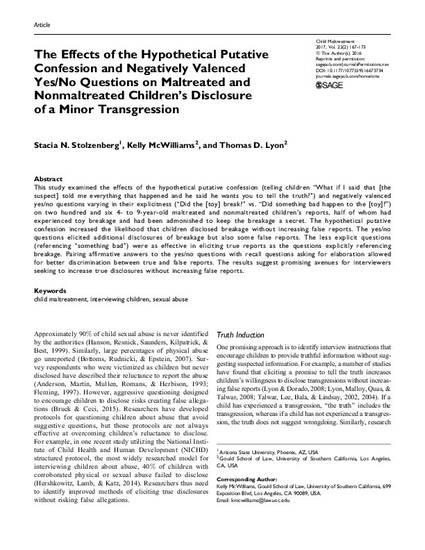
Article
54. The effects of the hypothetical putative confession and negatively-valenced yes/no questions on maltreated and non-maltreated children’s disclosure of a minor transgression.
Child Maltreatment (Published 2017)
(2016)
Abstract
This study examined the effects of the hypothetical putative confession (telling children “What if I said that [the suspect] told me everything that happened and he wants you to tell the truth?”) and negatively-valenced yes/no questions varying in their explicitness (“Did [toy] break?” vs. “Did something bad happen to the [toy]?”) on 206 4- to 9-year-old maltreated and non-maltreated children’s reports, half of whom had experienced toy breakage and had been admonished to keep the breakage a secret. The hypothetical putative confession increased the likelihood that children disclosed breakage without increasing false reports. The yes/no questions elicited additional disclosures of breakage but also some false reports. The less explicit questions (referencing “something bad”) were as effective in eliciting true reports as the questions explicitly referencing breakage. Pairing affirmative answers to the yes/no questions with recall questions asking for elaboration allowed for better discrimination between true and false reports. The results suggest promising avenues for interviewers seeking to increase true disclosures without increasing false reports.
Keywords
- hypothetical putative convession,
- yes/no questions,
- child abuse,
- child neglect,
- child maltreatment,
- child witness,
- child testimony,
- Minor transgression
Disciplines
Publication Date
September 19, 2016
Citation Information
Stolzenberg, S.N, McWilliams, K., & Lyon, T.D. (2017). The effects of the hypothetical putative confession and negatively-valenced yes/no questions on maltreated and non-maltreated children’s disclosure of a minor transgression. Child Maltreatment, 22, 167-173.
